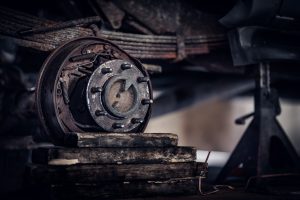Suspension Systems are an important but often overlooked system on your trucks and trailers. While brakes, batteries, oil changes, windshields and lights routinely get checked, suspension systems are often given too little attention.
When trucks and trailers are on the road, their suspension systems must endure every bump, rapid acceleration, deceleration, and winding turn while carrying a heavy load. All these factors cause vibrations which can stress the suspension system causing metal fatigue. This not only reduces the life of the components and the frame, but in extreme situations, vibrations may cause the load to shift, causing damage to sensitive cargo and creating a safety issue.
Another vital factor to consider is driver health and safety. Excessive vibrations can affect drivers thus impacting their efficiency and health. This can lead to fatigue, musculoskeletal disorders, and nerve damage. All this can be avoided through proper working suspension systems.
Fleet managers need to monitor, grease, and maintain suspension systems of their fleet to ensure shocks, springs, and other components are functioning properly. When necessary, repairing or replacing worn components ensures cost efficiency, safety, and minimizing fleet down time.
Many fleet managers work with mobile diesel mechanics to routinely inspect, repair, grease and maintain suspension systems. The best course of action is to inspect and grease the entire suspension system with each PM service or every 90 days (about 3 months).
(For the best results, have your fleet’s suspension systems inspected and repaired on-site by Mobile Wrench’s qualified diesel mechanics and diesel technicians.
Types of Suspension Systems
Let’s look at the different types of suspension systems you might encounter and the pros and cons of each in brief.
Leaf Springs: These are the simplest suspension systems as they comprise of sheets of metal which are placed on top of each other in a fashion that when they encounter a load the sheets/leaves flex providing a measure of shock absorbency. While not the most high-tech solution available, their ability to bear heavy loads while keeping installation and maintenance costs low make them one of the most popular choices for trucks and trailers.
The disadvantage of leaf springs is if the vehicle is not carrying a full load, the springs are not depressed, resulting in a very bumpy ride. Another disadvantage is leaf springs are exposed to road water, salt and dirt which can damage the suspension system requiring more frequent repair and or replacement.
Coil Spring Suspension Systems: Similar to leaf spring suspension systems except that they use metal coils instead of sheets to absorb shocks and support the weight of the truck as they compress when they hit a bump. These are also common as they are low cost. Their efficiency in absorbing shocks may be diminished at heavier loads as the springs that are compressed to limits will end up transferring the impact of the road directly to the frame of the truck and trailer. As with leaf springs, they are also subject to the elements and can therefore sustain damage and require repair. Frequent inspections therefore become necessary.
Torsion Bar Suspension Systems: These consist of a torsion bar mounted to the frame of the truck which absorbs shocks as the truck moves over bumps. While these are good at absorbing shocks and are durable, they do not offer progressive spring rate. They, however, are excellent at limiting the roll of the vehicle and provide automatic levelling as the suspension adjusts to road conditions.
Rubber Suspension Systems: These use rubber blocks or airbags to absorb Shocks. While light weight and easy to maintain these are not as durable as other suspension systems. Rubber becomes brittle with repeated exposure to the elements including UV radiation from sunlight.
Air Ride Suspension Systems: These are more complicated and comprise of components including valves, air lines, air spring bags so the system relies on a pump or a number of pumps to push air into valves, lines and air bags which ensure a smooth ride.
These systems have more moving parts and therefore are more expensive and require more care to operate and maintain. The advantage of a smoother ride for the driver and trailer and ability to transport fragile loads is offset by higher maintenance costs.
Suspension System Components
As important as the several types of suspension systems is knowing what suspension systems are comprised of. Each of these components contributes to the suspension system and each requires care and maintenance.
Wheels and Tires: These are often looked at as separate systems, but the reality is that they are one of the components of your suspension system. They are in direct contact with the road and transfer the energy from each road bump to the rest of the suspension system. Keeping the tires properly inflated ensures a smooth ride.
Springs: These can be coiled or leaved and they absorb the energy from the road by compressing and decompressing as the wheels pass over the road.
Rods and Linkages: These are the parts of the suspension system which provide connections and anchoring points.
Shock Absorbers: More engineered than simple coil springs or leaf springs these provide cushioning while the vehicle is in motion with a combination of springs, oil or air and even magnetic resistance to reduce the vibrations from the road that reach the trailer or cabin.
Care And Maintenance
With all the parts involved that go into making the suspension system it becomes important to take care of each system, allowing for repair or replacement as the components wear out. Some things to look out for that indicate the need for repair or replacement of a suspension system or component include:
- A bumpy ride
- Uneven tire wear
- Unstable body or lopsided truck/trailer
- Lowered vehicle
- Leaking oil
Some preventive maintenance for suspension systems is necessary as it is for engines. This includes:
- Regularly checking the inflation level of tires and tire treads.
- Rotate tires between 20-30 thousand miles.
- Tires on trucks may need closer inspection than trailer tires.
- Wheel alignment is also necessary to ensure even balance of the load on the suspension system.
- Check the fluid levels in the suspension systems regularly.
While some inspections may be carried out visually, it pays to have your vehicle inspected by a qualified diesel mechanic either at the shop or by using an on-site mobile service. Investing in professional services can ensure that you can catch issues before drivers become stranded at the side of the road.

